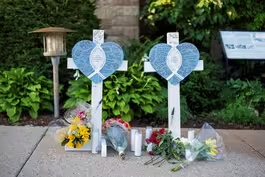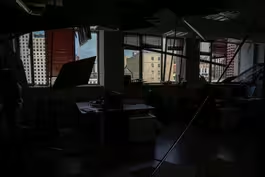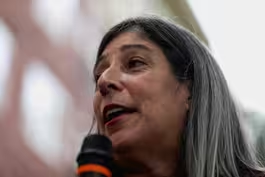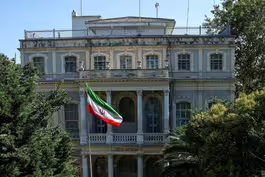
Katrina's lasting impact and concerns over future storms
Clip: 8/28/2025 | 9m 43sVideo has Closed Captions
20 years later, a look at Katrina's lasting impact and concerns over future storms
It's been 20 years since Hurricane Katrina devastated the Louisiana, Mississippi and Alabama coasts. While Katrina remains the costliest U.S. natural disaster, the deepest impact is found in the human suffering and the difficult journey toward recovery. For our series Tipping Point, Lisa Desjardins explores the lessons learned — and what still lies ahead as weather has become more extreme.
Problems playing video? | Closed Captioning Feedback
Problems playing video? | Closed Captioning Feedback
Major corporate funding for the PBS News Hour is provided by BDO, BNSF, Consumer Cellular, American Cruise Lines, and Raymond James. Funding for the PBS NewsHour Weekend is provided by...

Katrina's lasting impact and concerns over future storms
Clip: 8/28/2025 | 9m 43sVideo has Closed Captions
It's been 20 years since Hurricane Katrina devastated the Louisiana, Mississippi and Alabama coasts. While Katrina remains the costliest U.S. natural disaster, the deepest impact is found in the human suffering and the difficult journey toward recovery. For our series Tipping Point, Lisa Desjardins explores the lessons learned — and what still lies ahead as weather has become more extreme.
Problems playing video? | Closed Captioning Feedback
How to Watch PBS News Hour
PBS News Hour is available to stream on pbs.org and the free PBS App, available on iPhone, Apple TV, Android TV, Android smartphones, Amazon Fire TV, Amazon Fire Tablet, Roku, Samsung Smart TV, and Vizio.
Providing Support for PBS.org
Learn Moreabout PBS online sponsorshipGEOFF BENNETT: It has been 20 years since Hurricane Katrina devastated the Louisiana, Mississippi, and Alabama coasts.
More than 1,300 lives were lost in the storm's wake, the majority in New Orleans.
While Katrina remains the costliest natural disaster in U.S. history, the deepest impact is found in the human suffering and the long, difficult journey toward recovery.
For our series Tipping Point, Lisa Desjardins recently traveled to the region to explore the lessons learned by the U.S. and what still lies ahead as weather has become even more extreme.
MICHAEL WHITE, Musician: I didn't even realize how much music kind of vibrates through the city all the time until it wasn't there.
LISA DESJARDINS: For Michael White, the most difficult part of Hurricane Katrina was the silence that came after.
MICHAEL WHITE: Every footstep I made had a different kind of sound.
You realize that the heartbeat of the city is this vibrant pulse of music and life and joyous expression.
And that was completely gone.
LISA DESJARDINS: White is a clarinetist and among New Orleans' most beloved musicians, dedicating his life to the rich heritage of the city he loves.
For him and so many others, Katrina divided life in two, before and after.
GWEN IFILL, Former "PBS News Hour" Anchor: Hurricane Katrina hit the Gulf Coast hard today from Louisiana to the Florida Panhandle.
LISA DESJARDINS: On August 29, 2005, the Category 3 hurricane slammed into Southwest Louisiana.
After levees failed, 80 percent of New Orleans was underwater.
Thousands were rescued from rooftops.
Tens of thousands more sought refuge in the Superdome.
Across the region, over 1,000 people died from the storm.
JEFFREY BROWN: You mean the line right there?
MICHAEL WHITE: Yes, that's the highest point, and that was at least nine feet.
LISA DESJARDINS: In 2005, White showed "News Hour" the destruction.
The storm made some 300,000 homes uninhabitable.
And, in 2025, some still are.
It looks like there was some work done or has there been no work done on this house, do you think?
MICHAEL WHITE: It's hard to tell.
But one of the problems was a lot of people ran out of money to repair the houses.
LISA DESJARDINS: Abandoned buildings and empty lots still dot the city, some to this day bearing the telltale X left by Katrina's search-and-rescue teams.
MICHAEL WHITE: You know, a lot of this area has come back, but, as you can see... LISA DESJARDINS: Right.
MICHAEL WHITE: ... we have a row of houses that are still abandoned nearly 20 years later.
LISA DESJARDINS: White returned from evacuation to find almost nothing could be saved, not his historic photos, not his sheet music, and not his dozens of historic clarinets.
MICHAEL WHITE: Each instrument is like a person that has its own sound, its own personality and moods almost.
I couldn't bear to open those cases, because, to me, those are bodies inside.
LISA DESJARDINS: White built a new clarinet collection, but the city is not reborn.
New Orleans' population today is a quarter smaller than it was when Katrina struck.
There are new levees in place, but some still question whether this city and the country are ready for the next big storm.
That includes the man who led the Katrina response, Russel Honore.
He questions the federal approach now.
LT. GEN. RUSSEL HONORE (RET.)
(U.S. Army): It doesn't make sense.
It doesn't make sense.
And, again, it goes back to the lessons learned from Katrina.
LISA DESJARDINS: Few understand the complex issues and high-stakes better.
The retired lieutenant general led Joint Task Force Katrina.
His no-nonsense approach was credited with turning around a chaotic situation.
Now he sees another tricky landscape.
He's worried about federal cuts to key agencies, but assured by the new levee system.
LT. GEN. RUSSEL HONORE (RET.
): We put $114 billion into recovery in Louisiana, about $14 billion of that in a levee protection system.
And we had a storm three years after Katrina came and the levees held.
ALESSANDRA JEROLLEMAN, Loyola University New Orleans: In many ways, we are much better if we faced Katrina.
But we won't face Katrina.
We will face new storms that are different than Katrina.
LISA DESJARDINS: Alessandra Jerolleman of Loyola University New Orleans lost her home, her car and much of the community she loved in Katrina.
That transformed her purpose to disaster preparation and recovery.
And she is concerned.
ALESSANDRA JEROLLEMAN: It is always a big concern for me that we might see a large hurricane, we might see rapid intensification where folks can't leave.
LISA DESJARDINS: Like Honore, she's worried about a political storm, the Trump cuts to weather and natural disaster agencies, including the Federal Emergency Management Agency.
DONALD TRUMP, President of the United States: We want to wean off of FEMA, and we want to bring it down to the state level.
LISA DESJARDINS: President Trump and Homeland Security Secretary Kristi Noem now say they want to reform FEMA, shifting more to the states, which they argue do a better job.
KRISTI NOEM, U.S.
Homeland Security Secretary: The president recognizes that FEMA should not exist the way that it always has been.
It needs to be redeployed in a new way.
LISA DESJARDINS: But Honore is blunt.
LT. GEN. RUSSEL HONORE (RET.
): The states aren't ready.
I think the political-speak about wanting to get rid of FEMA and reducing its involvement in response is putting doubt in a lot of people's mind.
LISA DESJARDINS: This as the Gulf Coast faces more extreme weather.
Global temperatures and ocean temperatures are rising.
And the Trump administration has made key climate data harder to access.
But no one can deny this January New Orleans shattered its snowfall record, followed by record heat this summer.
LT. GEN. RUSSEL HONORE (RET.
): Since Katrina, scientists have done a lot of work to document these strong storms and the anomalies associated with -- and the science by why the storms appear to be stronger, or why we're having two and three 100-year storms in a 10-year period.
ALESSANDRA JEROLLEMAN: What we see with climate change is some shifts in the parameters of weather events.
LISA DESJARDINS: Are you worried the lessons could be forgotten?
ALESSANDRA JEROLLEMAN: I am worried.
We have to think about disasters like hurricanes in a more holistic fashion, right, because the problem in Katrina, it wasn't just the hurricane.
It was certainly the problems with the maintenance of the levees, but also coastal erosion, land loss, the long history of the oil and gas canals that hadn't been closed off.
All of these myriad factors that were just piling on risk.
LISA DESJARDINS: There is holistic thinking on a local level here, like in the hard-hit Lower Ninth Ward.
ARTHUR JOHNSON, Sustain the Nine: There were a lot of promises after Katrina, but not a lot of fulfillment of those promises.
LISA DESJARDINS: Arthur Johnson helps run a group known as Sustain the Nine.
ARTHUR JOHNSON: We lost a lot of trees from Katrina, millions of trees.
And then every year you have a storm and that takes trees out.
LISA DESJARDINS: They are now planting cypress trees and other native plants to reduce erosion and teaching sustainability in the face of increasingly wild weather like tornadoes.
ARTHUR JOHNSON: We're no longer just dealing with hurricane and hurricane season, which is now six months out of the year.
LISA DESJARDINS: Like many low-lying places hit by Katrina, this area is at higher risk for problems.
But this group insists on rebuilding.
WILLIAM WAITERS, Sustain the Nine: We're not going away.
I mean, Katrina couldn't drown us.
So we damn well ain't going to allow no politician and their failed programs to drown us.
It's not going to happen.
LISA DESJARDINS: That's not the only existential debate connected to Katrina.
Musician Michael White feels it.
MICHAEL WHITE: There is no return to normal.
Life as I knew it ended with Katrina.
And it took a long time for that to sink in.
I feel like I'm on my second life, because everything changed.
Everything was destroyed or gone.
And a part of me kind of died with Katrina.
LISA DESJARDINS: But something else was born.
He rarely composed before the storm, but now writing songs has become a daily lifeline.
MICHAEL WHITE: I just pick up my clarinet and I don't think about it.
I just play a note.
I don't know what comes after that, but I will just play another note.
And so from there, I will go: MICHAEL WHITE: After kind of coming away from the pain and the difficulties of Katrina for many years, my mind seemed to open up.
And it seems like all of the music that I have ever heard is kind of in my head simmering around, like a gumbo pot.
And it's like if you stir the pot you never know what comes up, like, a shrimp, an oyster, hot sausage.
All of those things are in gumbo, and that's kind of what it's like.
LISA DESJARDINS: Twenty years on, New Orleans still has not recovered from Katrina.
But like the music it helped create, it keeps improvising.
For the "PBS News Hour," I'm Lisa Desjardins in New Orleans.
Man speaks after wife's ICE detention led to hospitalization
Video has Closed Captions
Clip: 8/28/2025 | 7m 2s | 'We felt ambushed,' man says after wife's ICE detention led to hospitalization (7m 2s)
Minneapolis mourns lives lost in Catholic school shooting
Video has Closed Captions
Clip: 8/28/2025 | 7m 12s | Minneapolis mourns 2 children killed in Catholic school shooting (7m 12s)
News Wrap: Russian drone attack on Kyiv kills at least 18
Video has Closed Captions
Clip: 8/28/2025 | 8m | News Wrap: Russian drone attack on Kyiv kills at least 18 (8m)
N.H. arts groups face budget blow as state slashes funding
Video has Closed Captions
Clip: 8/28/2025 | 7m 49s | New Hampshire arts groups face double budget blow as state slashes funding (7m 49s)
'Public health is in trouble,' says former CDC official
Video has Closed Captions
Clip: 8/28/2025 | 7m 14s | 'Public health is in trouble,' says high-ranking CDC leader who resigned in protest (7m 14s)
Why European countries want to reimpose sanctions on Iran
Video has Closed Captions
Clip: 8/28/2025 | 5m 30s | Why European countries want to reimpose harsh sanctions on Iran (5m 30s)
Providing Support for PBS.org
Learn Moreabout PBS online sponsorshipSupport for PBS provided by:
Major corporate funding for the PBS News Hour is provided by BDO, BNSF, Consumer Cellular, American Cruise Lines, and Raymond James. Funding for the PBS NewsHour Weekend is provided by...

















